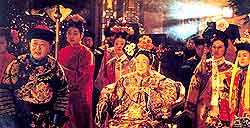|
In our media-saturated world - where
advertisements keep track of how many times you view
them, the arts sections of well-respected newspapers
speak of performers as "software," and the middle of
the Sahara is just a few mouse-clicks away from free,
high-resolution pornography - it's hard to get excited
about pictures that move.
With director Ann Hu's new film Shadow
Magic, however, we are transported back to the pre-AOL
Empire days of 1902 Beijing, where moving pictures were
not only considered a devilish "foreign trick," but,
according to Hu's vision, a fearsome technology that
threatened to single-handedly destroy Chinese culture.
(This was a feat, of course, that would only be accomplished
much later by the combined forces of Baywatch, Starbucks,
and the Big Mac Happy Meal).
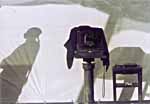
Shadow Magic's fictionalized account
of the characters and events which led to the making
of the first Chinese film - the Beijing Opera classic
Dingjun Mountain - is a visual treat that richly portrays
turn-of-the-century Beijing and the kinky clash of a
modernizing west and a stubbornly retro east. Unfortunately,
no amount of visual magic can pull the narrative rabbit
out of Shadow Magic's hat. Director and co-writer Hu
eschews telling the story of the making of China's first
film in favor of a clichŽ-ridden soap opera spiced up
with generous helpings of plot-points, characters and
soundtrack bites from Cinema Paradiso, Giuseppe Tornatore's
classic ode to a young man's passion for projectors
and blondes.

Liu Jinglun (played by In the Heat
of the Sun's criminally-talented Xia Yu) is the young
chief photographer of the Feng Tai Photo Shop, where
the upper echelons of Beijing society have their souls
stolen for a reasonable fee. When down-on-his luck British
profiteer Raymond Wallace (Jared Harris, I Shot Andy
Warhol), barges in trying to pitch Beijing's first nickelodeon
("five-cent theater"), Feng Tai boss Master Ren promptly
gives him the boot, while Beijing Opera star Lord Tan
smells the beginning of the end in the newfangled "barbarian"
technology. But Liu is hooked.
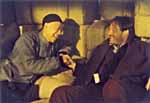
Shadow Magic's story begins two years
after the Boxer Rebellion was brutally crushed by western
expeditionary forces and a weak-willed Qing court that
reneged on its support of the anti-foreigner Boxers
faster than you can say "Bay of Pigs." In the wake of
staggering remunerations and the humiliation of China's
government - including the insult of having GI Joes
squatting in the Forbidden City for an entire year -
Beijingers weren't exactly eager to hear the West's
latest bright new idea. (Force-fed Christianity and
opium were fun enough, thank you very much.)
Against the backdrop of this xenophobic
zeitgeist, the insatiably curious, mechanically-minded
young Liu is torn between loyalty to tradition and the
wondrous new Western technology of Wallace's "magic
shadows." Liu's conflict, unfortunately, is something
of a no-brainer: he must choose between an arranged
marriage to an old, obese, ugly widow (cleverly named
"Widow Jiang") whom he doesn't want to marry - because,
well, she's old, obese, and no fun to look at - and
the promise of making it big in the film business with
Wallace.
But Liu's inner tug-of-war between
the weight of filial duty and the glitter of showbiz
is further complicated by the fact that he's also madly
in love with Ling, the cinema-phobic Lord Tan's adoptive
daughter, an obsequious Gong Li look-alike who spends
most of the film "obsequiating" (a film-acting technique
taught at the Beijing Film Academy which involves projecting
powerless beauty under a smoldering veneer of sexual
repression by never looking anyone in the eye, keeping
one's neck immobile, and pouting a lot). If Liu betrays
family and tradition, he gets to make films instead
of marrying the fat, old Widow Jiang, but will also
offend the Luddite Lord Tan, and ruin any chance of
winning Ling's hand in marriage - which, if you'll remember
from the previous paragraph, wasn't a possibility in
the first place.
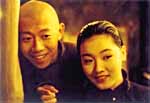
Writer/director Hu breaks one of
Aristotle's fundamental principles of storytelling:
Comprehending the hero's central dilemma should not
require a degree in differential calculus. So, in order
to solve this narrative snafu, Hu does what any astute
NYU Film School graduate is trained to do: engineer
a gratuitous explosion.
When Wallace is invited to put on
a private screening for the Empress Dowager's birthday
celebration, the show is a big hit with the fun-loving
Cixi until the film projector explodes, crippling Liu,
and nearly burning down the Imperial Palace. The enraged
Cixi has Wallace banished from China and spares Liu's
life only when Lord Tan intervenes.
Months later, when all seems lost
for the gimpy Liu - yet another hapless victim of exploding
hand-cranked film projectors - a package arrives in
the mail from Wallace containing a surprise gift that
will alter Liu and China's cinematic destiny: the strips
of film he and Wallace shot of local Chinese characters
and scenes. (This clever narrative device wouldn't have
echoed Cinema Paradiso's memorable finale so obviously
had composer Zhang Lida's bald-faced appropriation of
Ennio Morricone's soundtrack not made it so difficult
to ignore.)
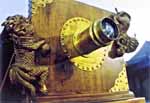
Splicing together the express-mailed
strips of film, Liu revives the defunct Shadow Magic
theater as China's first blockbuster documentary wows
local audiences. Liu then easily earns Master Ren and
Lord Tan's approval of the new technology, because,
we must assume, they didn't fear the technology itself
or it's potential to outflank traditional forms of culture;
they were just presciently aware of the future threat
that Bruce Willis and Leonardo DiCaprio would pose to
the domestic box office, and are duly relieved once
they realized Chinese faces can be filmed too.
In a final and unsubtle homage to
Cinema Paradiso, Liu not only wins Ling's heart, but
does so as any self-respecting male filmmaker would
have it: in the projection booth, with a reel of film
in one hand and a shapely young woman in the other.
Despite an unnecessarily clichéd
story line, there is much to recommend Shadow Magic.
The cast itself is one of the strongest co-production
ensembles assembled since The Last Emperor. In the roles
of Master and Madame Ren, Liu Peiqi (Ermo) and Lu Liping
(Blue Kite), although painfully under-utilized in the
film, demonstrate why they are two of their generation's
finest actors and lend the film an imprimatur of authenticity
that is difficult to underestimate. If only they'd had
more room to perform.
As the stuffy, legend-in-his-own-time
Lord Tan, Li Yusheng, himself one of China's elder statesmen
of Beijing Opera, gives vibrancy to the traditional
art form of which he is an undisputed master. And it
is in the character of Lord Tan (who later becomes the
star of China's first movie) that we sense the biggest
promise of Hu's story. Beijing Opera, a frenetically
dynamic art form, interweaves sound and image, motion
and music with an intensity that would leave a modern
action hero gasping for air. During several delightful
scenes where Li struts his stuff, the traditionalist
in each of us finds it easy to share Lord Tan's wariness
of a circus gadget that captures images in motion, but
records neither color nor sound.
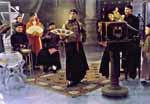
And, in stark contrast to what was
technically possible in the early days of silent movies,
Shadow Magic's recreation of Beijing in 1902 - from
wardrobe, to set design, props, and extras - is without
question quite spectacular. In addition to an artful,
disciplined use of archival film footage of Old Beijing,
we are offered a visual introduction to the early mechanics
of filmmaking, including such archeological treats as
a Praxinoscope, a device invented in 1877 which showed
a sequence of images projected by mirrors on a revolving
drum. Another early cinema artifact that is almost meaningless
to MTV-addled minds is the initial sense of wonder and
fear with which early audiences - Chinese and western
alike - reacted to moving images.
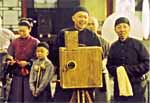
And it is just that universal sense
of wonder that makes the failure of Shadow Magic's story
so disappointing. The intuitive emotional response to
moving images projected on a flat screen was as cross-culturally
powerful as cave paintings, sex or the roar of a thunderclap.
Although the fictional Raymond Wallace is depicted as
a romantic evangelist of the empowering potential of
movies, this particular import was radically different
from Christianity and opium; the Chinese - one of the
most visually sophisticated cultures in history - must
have "got the picture" without much converting from
foreigners.
In fact, there was no single foreign
figure like Raymond Wallace who mentored the Chinese
into a realization of the possibilities of film. Foreigners
introduced the technology and business of film production
and exhibition to China, but Wallace's role in Shadow
Magic (and the painfully awkward English dialogue associated
with his character) is more a reflection of present-day
Chinese co-production financing, which requires a reasonably
famous non-Chinese actor to secure foreign investment,
and find a "cross-over" audience. (Thankfully, Hu didn't
opt for the almost de rigueur co-production practice
of forcing a Caucasian-Chinese love subplot into the
mix.)
And despite a blunt-edged message
about the need for China to open up to new ideas, it
is very unlikely that successful entrepreneurs and artists
like Master Ren and Lord Tan were even remotely as ignorant
and utterly lacking in curiosity as Shadow Magic portrays
them. Indeed, Hu blithely fails to examine the process
by which educated Chinese must have quickly recognized
and been intrigued by the new technology's power while
carefully weighing its potential threat to their worldview
and livelihood.
So, in addition to leaving us hungry
for the actual story of the making of Dingjun Mountain,
the most disturbing aspect of Shadow Magic is the film's
intellectually lax and recklessly misleading portrayal
of the history of the birth of Chinese cinema. The director
admitted, surprisingly, that only 10 percent of her
film is based in fact, despite a marketing campaign
and documentary-style credit sequences that clothe Shadow
Magic in a mantle of historical veracity. If so, then
the story of the making of China's first movie remains
untold, and this film is indeed a wasted opportunity
to describe an important junction of China's history.
Sadly, for young Chinese audiences
who might mistake this film for history, and foreign
audiences who almost certainly will, the unwitting irony
of Shadow Magic is that director Hu has justified her
own character Lord Tan's biggest fear: "It will be our
own people who destroy us."
Shadow Magic
is now showing in theaters throughout Beijing through
Chinese New Year.
|


